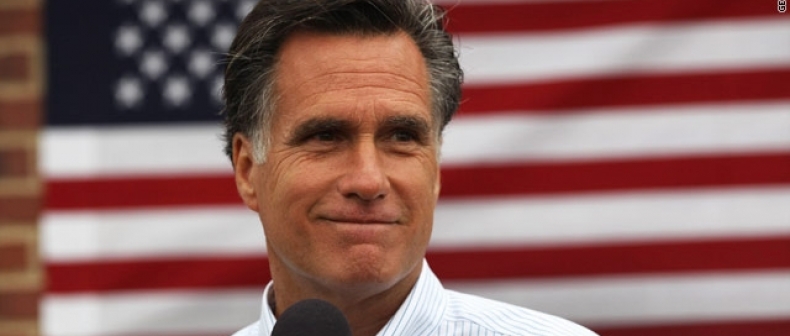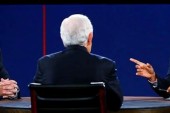
Image: Flickr
Tuesday marked the end of a ï¬ve-day bus tour for Mitt Romney, as the presidential hopeful campaigned through a few swing states espousing his message of “An American Century,” as well as criticizing Obama on immigration, and hosting (I kid you not) an ice cream social.
The tour featured the expected rhetoric of ï¬xing the economy, helping the American family, and kicking Obama out of ofï¬ce, but when it came to issues of foreign policy Mitt was mute. This isn’t out of the ordinary, as it’s been a while since Romney’s campaign has made any signiï¬cant statements on foreign policy (and even then they were decidedly non-speciï¬c).
The lack of any cohesive foreign policy for Romney has left analysts confused over what, if anything, Romney thinks of global affairs. Even though foreign policy isn’t currently a hot button issue for voters this election, the world still obviously has a vetted interest in knowing how Romney would use American power if elected. Unfortunately, Mitt is unlikely to give an answer to that question anytime soon, most likely because he doesn’t know, and perhaps more troublingly, because he doesn’t care.
While a ‘Romney Doctrine‘ certainly doesn’t exist when it comes to foreign policy, there are some strong statements in Mitt’s few speeches on the subject that have led to speculation about what his worldview might be. The problem with analyzing these statements is that many are contradictory or lack detail. As Jackie Northam of NPR reports, when regarding Syria “he [Romney] suggested that President Obama be more aggressive,” but “also suggested that he would be anxious to use military force there.”
Romney’s view of the intervention in Libya was similarly befuddling, as he flopped back and forth on the US role in the revolution and when it comes to Iran, he has talked a hard line when it comes to stopping their nuclear program, but offered no new solutions as to how to do that. The most that anyone in Romney’s camp has elaborated on the subject of Iran is a close advisor to Mitt who stated to New York Times’ David Sanger that the for now the campaign was “just happy to leave the impression that when Obama says he’ll stop an Iranian bomb he doesn’t mean it, and Mitt does.”
Where Romney seems to have some actual conviction however, is in relations with Russia; a nation he has said to be America’s “number one geopolitical foe.” His view on Russia features prominently in his book, and led to him being the foremost critic of the new round of START talks – intended to bring about nuclear disarmament and non-proliferation. Romney declared in a 2010 Washington Post op-ed that the treaty which resulted from the talks “must not be ratified” and was a threat to American safety.”
Despite his plea, the treaty is now in effect, while his op-ed has since been criticized by arms experts and referred to as “idiotic” by international politics professor and Foreign Policy contributor Dan Drezner.
Mitt Romney’s adversarial stance on Russia would have far reaching implications on global affairs if he were elected, as negotiations with Arab states and Iran would become much harder without pressure from the Kremlin. Furthermore, there would likely be a direct and profound impact on Canada that the Harper government would welcome with open arms, as it would likely mean a great deal of U.S. support for Canada when it comes to issues of Arctic sovereignty.
As the States greatest trading partner, it would be imperative that Canada secure the vast reserves of resources that lay in the contentious waters to our north from Russian expansion. While there are already joint troop movements each year to ‘scare the bear‘ and assert control of the potential wealth of oil, one could expect an even more aggressive policy were the Americans and Russians at odds.
This is ultimately all just speculation though, as Romney keeps attention away from foreign policy, an area where most Americans see Obama as doing fairly well in, and focused on the economy. Though while Romney may not be talking, some of his advisors have been, and what they recently told David Sanger may be the most accurate way of looking at Romney on foreign policy.
“I’m not sure that anyone knows if the candidate has a strong view of his own,” one advisor told Sanger, reflecting the common held belief that he is merely a vessel for his many think-tank experts. Another advisor stated that “Romney doesn’t really want to engage in these issues until he’s in office,” giving credence to the notion that Romney simply has very little interest in global affairs. The latter of these two statements is in a way the most believable, as his stance on foreign policy isn’t what will win him the election, nor is it something that he has any expertise in. Instead his foreign policy is left to a wide team of advisors that lean mostly neocon, while remaining unable to form a singular doctrine that voters can easily embrace.
Until the presidential debates begin, or perhaps even later, the question of Romney’s foreign policy is open to speculation. With the neocon advisors behind him it may be that he is likely to follow some of the Bush doctrine, but that could alienate him from an increasingly isolationist Republican party. Furthermore, his hard line on Russia may be a personal conviction, but it may not stand up to realpolitik. One assumes that Sheldon Adelson’s millions in contributions will make him closer to Israeli hawks, but like many leaders he may find dealing with Netanyahu an exhausting enterprise. He may even divert all U.S. intelligence funding into finding an answer to the Baha Men’s eternal question. The unsatisfying truth of the matter is that no one, including his advisors, really knows what Mitt Romney thinks about foreign policy matters, just that he doesn’t think about it very much.
_____
Nick Robins-Early is a freelance journalist currently based in Washington, D.C. Follow him @nickrobinsearly.
For more, follow us on Twitter at @torontostandard and subscribe to our newsletter.














